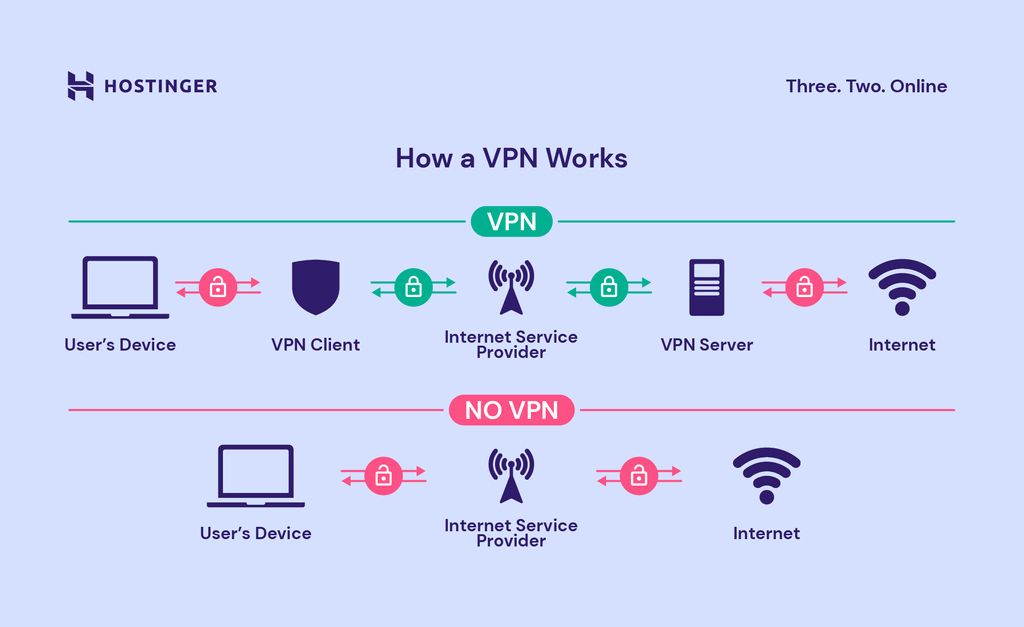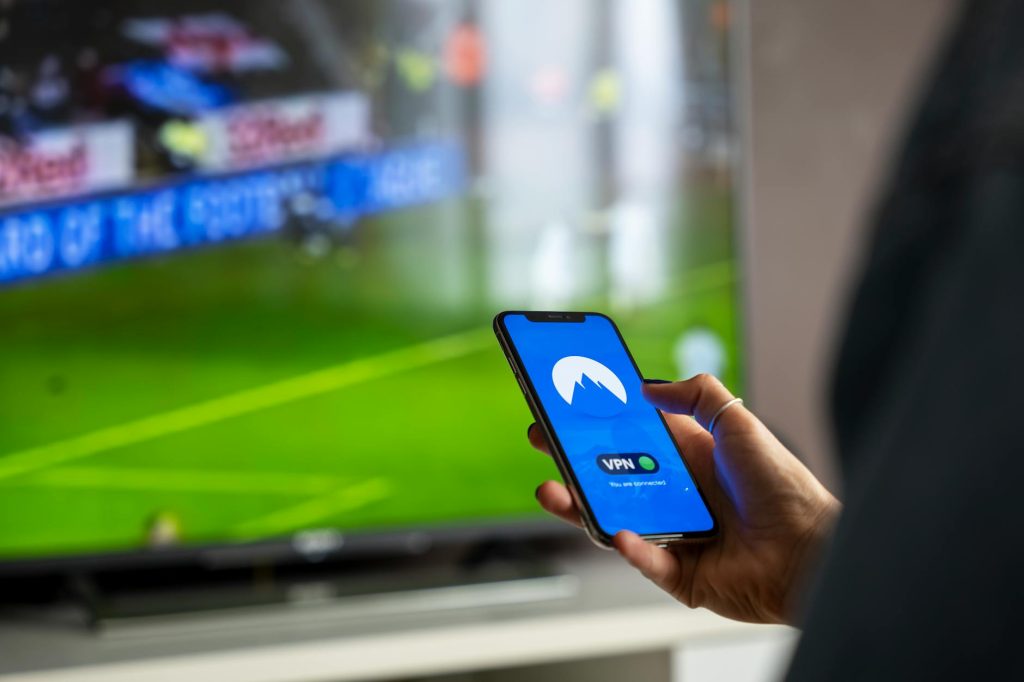Today we’re gonna talk about VPNs and how they work. Sounds fancy, right? But don’t worry, it’s not as complicated as it sounds. Basically, a VPN is a tool that helps you stay safe and secure online by encrypting your data and hiding your IP address. In this article, we’re gonna give you the lowdown on VPNs – how they work, their benefits, and their drawbacks. We’ll also help you choose the right VPN for you and give you tips on how to set it up. So if you’re ready to get your VPN game on, let’s dive right in!
Do you ever want to use public Wi-Fi but worry that someone might be spying on your online activities? Or maybe you want to access content that’s not available in your country? That’s where VPN comes in handy!
What’s a VPN?
VPN stands for Virtual Private Network. It’s like a secret tunnel between you and the internet. When you connect to a VPN, your internet traffic is encrypted and routed through a server located in another location. This means your online activities are hidden from anyone who may be trying to snoop on you, and you can access geo-restricted content as if you were in a different country.
So, next time you’re wanting to use public Wi-Fi or access content that’s not available in your region, just remember that VPN can help keep you safe and give you access to what you’re looking for.

How does a VPN work?
Let me break it down for you. So, you know how when you browse the internet, your computer sends out requests to different websites, right? Well, those requests go through your internet service provider (ISP), which means that your ISP can see everything you’re doing online. And let’s be real, that’s kinda sketchy.
But that’s where a VPN comes in. VPN stands for Virtual Private Network, and basically, it creates a secure and private connection between your computer and the internet. When you use a VPN, your internet traffic gets encrypted and sent through a private tunnel to a server owned by the VPN provider.
This means that your ISP can’t see what you’re doing online, because all they see is encrypted traffic going to the VPN server. And since the traffic is encrypted, anyone else who might be snooping on your internet connection (like hackers or government agencies) won’t be able to see what you’re up to either.
Plus, using a VPN can also help you bypass geo-restrictions and access content that might be blocked in your region. So, if you want to keep your internet browsing private and secure, or if you want to access restricted content, a VPN is the way to go.
Benefits of using a VPN
There are a ton of benefits to using a VPN, my friend. Here are just a few:
- Increased Security: As I mentioned earlier, a VPN encrypts your internet traffic, making it much more difficult for hackers, snoopers, and other cyber-criminals to intercept your data. This is especially important if you’re using public Wi-Fi networks, which are often unsecured and vulnerable to attacks.
- Anonymity: A VPN also allows you to browse the internet anonymously. Since your IP address is hidden behind the VPN server’s IP address, websites won’t be able to track your location or identify you based on your IP address.
- Bypassing Geographical Restrictions: If you’re traveling abroad, or if you just want to access content that’s not available in your region, a VPN can help you bypass geographical restrictions. By connecting to a VPN server in a different country, you can access content that might be blocked in your region.
- Better Online Gaming: VPNs can also improve your online gaming experience by reducing lag and latency. This is especially important for online gamers who want to minimize lag and ensure a smooth gaming experience.
- Cost Savings: Finally, using a VPN can also help you save money. Some VPNs can help you find the best deals on flights, hotels, and other online purchases by showing you prices that are only available in certain regions.
Overall, there are a ton of benefits to using a VPN. Whether you’re looking to improve your online security, access restricted content, or save money on online purchases, a VPN can help you do it.
Drawbacks of using a VPN
While there are definitely some great benefits to using a VPN, it’s also important to be aware of some of the potential drawbacks. Here are a few things to keep in mind:
1. Slower Internet Speeds
When you use a VPN, your internet traffic has to travel through an extra step (the VPN server), which can sometimes slow down your internet speeds. Depending on the quality of the VPN provider and the distance between you and the VPN server, you may notice a decrease in internet speeds.
2. Increased Latency
In addition to slower internet speeds, using a VPN can also increase latency, which is the time it takes for data to travel between your device and the server. This can be especially noticeable for online gamers, who require low latency to ensure a smooth gaming experience.
3. Limited Access to Certain Websites
Some websites and online services don’t allow access from VPNs, either because they want to ensure the user’s location or because they block VPNs to prevent fraud or abuse. This can limit your access to certain websites or services, especially if you’re traveling abroad.
4. Trustworthiness of VPN Providers
There are a lot of VPN providers out there, and not all of them are trustworthy. Some VPNs have been known to collect user data and sell it to third parties, which kind of defeats the whole purpose of using a VPN in the first place. It’s important to do your research and choose a reputable VPN provider.
5. Cost
Finally, some VPNs can be quite expensive, especially if you’re looking for a high-quality service with lots of features. While there are definitely some great free VPN options out there, many of them have limitations or are not reliable, so you may have to pay for a good VPN service.
Overall, while there are definitely some potential drawbacks to using a VPN, they are generally outweighed by the benefits. Just make sure to choose a trustworthy provider, and be aware that there may be some limitations or trade-offs when using a VPN.
Is VPN illegal?
No, using a VPN is not illegal in most countries. In fact, VPNs are a legitimate tool for protecting your online privacy and security, and they are used by millions of people around the world.
However, it’s worth noting that some countries have stricter regulations regarding the use of VPNs. For example, in China, the government heavily regulates the use of VPNs and has even banned some VPN services altogether. In other countries, using a VPN for illegal activities (such as hacking, online fraud, or piracy) may be illegal, but this has nothing to do with the VPN technology itself.
It’s always a good idea to do some research and make sure you understand the laws and regulations in your country or region before using a VPN. But in general, using a VPN for legitimate purposes (such as protecting your privacy and security) is not illegal.

Choosing the right VPN
Choosing the right VPN can be a bit overwhelming, as there are so many options out there. Here are some factors to consider when choosing a VPN:
A. Security and Privacy
The most important factor to consider is the level of security and privacy offered by the VPN. Look for a VPN that uses strong encryption protocols, has a strict no-logs policy, and offers features like a kill switch to protect your data in case the VPN connection drops.
B. Speed and Performance
Another important factor is the speed and performance of the VPN. Look for a VPN with fast connection speeds and low latency, especially if you plan on using it for streaming, gaming, or other bandwidth-intensive activities.
C. Server Locations
The more server locations a VPN has, the more options you’ll have for bypassing geo-restrictions and accessing content from around the world. Look for a VPN with a large network of servers in multiple countries.
D. User-Friendliness
A good VPN should be easy to set up and use, even for beginners. Look for a VPN with a user-friendly interface and clear instructions for installation and configuration.
E. Price
Finally, consider the price of the VPN. While there are some great free VPN options out there, they often come with limitations or are not as reliable as paid options. Look for a VPN that fits your budget while still offering the features and security you need.
Overall, choosing the right VPN requires some research and careful consideration of your needs and priorities. By taking the time to choose a high-quality VPN that meets your needs, you can enjoy greater online security and privacy while browsing the web.
Free vs. Paid VPN services
When it comes to VPN services, there are both free and paid options available. Here are some of the differences between free and paid VPN services:
Security and Privacy
Free VPNs may not offer the same level of security and privacy as paid VPNs. Some free VPNs may even log your data and sell it to third parties. Paid VPNs, on the other hand, often have more advanced security features, such as stronger encryption protocols and a strict no-logs policy.
Server Locations
Paid VPNs generally have a larger network of servers in more countries, which can give you more options for bypassing geo-restrictions and accessing content from around the world. Free VPNs often have a limited number of servers, which can lead to slower speeds and less reliable connections.
Speed and Performance
Paid VPNs generally offer faster connection speeds and lower latency than free VPNs, which can be important for streaming, gaming, and other bandwidth-intensive activities.
User Support
Paid VPNs often offer better customer support than free VPNs, with more ways to contact support and faster response times.
Cost
Obviously, the biggest difference between free and paid VPNs is the cost. While free VPNs can be tempting, keep in mind that they may not offer the same level of security and privacy as paid VPNs. Additionally, some free VPNs may inject ads into your browsing experience or limit your bandwidth, which can be frustrating.
Overall, while free VPNs can be a good option if you’re on a tight budget, paid VPNs generally offer more advanced security and privacy features, faster speeds, and better customer support. It’s worth doing some research and considering your priorities before deciding which type of VPN to use.
Best practices for using a VPN
Alright, so you wanna use a VPN to keep your online stuff private and secure? Here are some things to keep in mind:
- Go with a VPN provider that’s legit: Do some research and pick a provider that’s got a good rep for keeping your data safe and not logging your activity.
- Make a strong password and use two-factor authentication if you can: You don’t want some random hacker getting into your VPN account and snooping on your online activity.
- Use the kill switch: This is a feature that shuts off your internet connection if your VPN connection drops, so your data doesn’t get exposed.
- Keep your software updated: Always make sure you’re running the latest version of your VPN software, as updates usually have important security fixes.
- Use a server in a country that’s chill about privacy: If you’re worried about privacy, connect to a server in a country with good privacy laws, like Switzerland or the Netherlands.
- Avoid sketchy public Wi-Fi: Even with a VPN, public Wi-Fi can be risky. If you gotta use it, make sure to connect to your VPN before hopping on the network.
- Remember that a VPN isn’t perfect: While VPNs can help keep your data private, they won’t save you from all the bad stuff out there. So, stay alert and don’t fall for phishing scams or malware.
By following these tips, you’ll be on your way to using a VPN like a pro.
Top 5 Paid VPNs
1. NordVPN
- The Privacy Powerhouse: NordVPN reigns supreme in the security arena, boasting military-grade encryption, a strict no-logs policy, and an independently audited kill switch. Its vast network of over 5,500 servers in 60 countries guarantees lightning-fast speeds and seamless global access.
2. ExpressVPN:
- The Blazing Buccaneer: ExpressVPN lives up to its name, delivering unparalleled speed and performance. Its intuitive interface and user-friendly apps make it a breeze for tech novices and veterans alike. While its price tag might raise an eyebrow, the unwavering reliability and top-notch customer support justify the investment.
3. Surfshark:
- The Budget-Friendly Behemoth: Surfshark proves that affordability doesn’t have to compromise quality. This pocket-friendly powerhouse offers unlimited simultaneous connections, robust security features, and a user-friendly interface. Its growing network, while not as extensive as NordVPN’s, still provides ample server options for global browsing.
4. Private Internet Access (PIA)
- The Customization Crusader: PIA caters to the tinkerers and privacy enthusiasts. Its extensive customization options allow you to fine-tune your VPN experience, from encryption protocols to kill switch behavior. While its speeds might not match the top contenders, its dedication to user control and its affordable price tag make it a compelling choice.
5. CyberGhost:
- The User-Friendly Enigma: CyberGhost lives up to its name, offering a ghost-like browsing experience for even the most tech-averse users. Its intuitive interface and one-click connection make it a breeze to hop onto a secure server. While its security features might not be as robust as NordVPN or ExpressVPN, its ease of use and competitive price make it a solid choice for casual users.
Top Free VPNs
1. ProtonVPN
ProtonVPN offers a free tier with unlimited data and decent speeds, but server selection is limited and you can only connect to one device at a time.
2. Windscribe
Windscribe also provides a free tier with 10GB of data per month and a decent server network. However, speeds can be inconsistent and data caps can be restrictive for regular users.
3. TunnelBear
TunnelBear’s free plan offers 500MB of data per month and a limited server network. While not ideal for heavy data users, it’s a good option for casual browsing on public Wi-Fi.
Conclusion
Whether you’re a concerned coffee shop Wi-Fi warrior or a privacy-conscious global citizen, understanding and utilizing a VPN empowers you to take control of your online world. With this beginner’s guide, you now have the knowledge to navigate the sea of VPN options, choose the right service for your needs, and unlock the benefits of a secure and private online experience.
So, dive in, encrypt your traffic, and explore the internet with newfound confidence, knowing you’re armed with the tools to protect your data and access the content you desire. Remember, the digital world is your oyster, and a VPN is the pearl that unlocks its full potential. Happy browsing!

